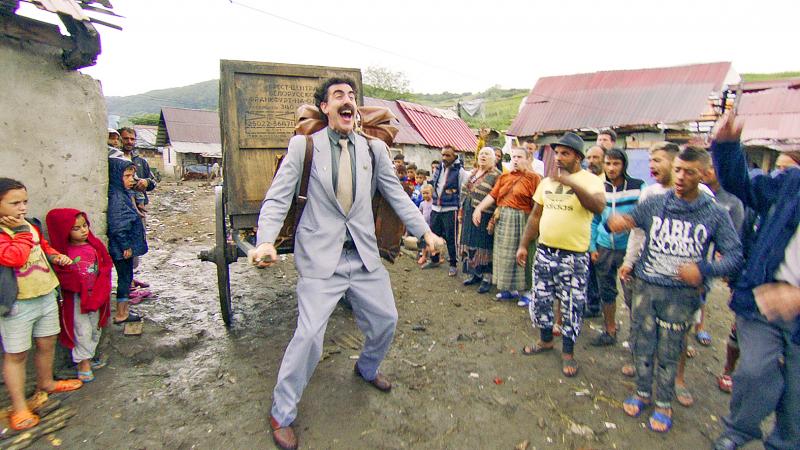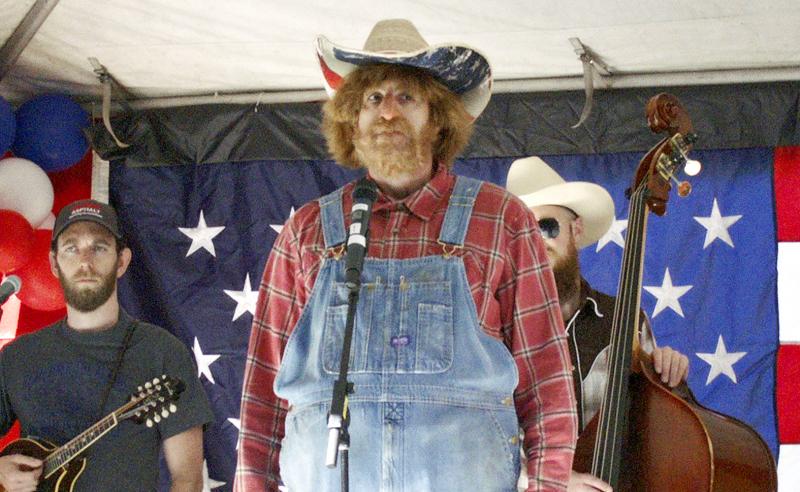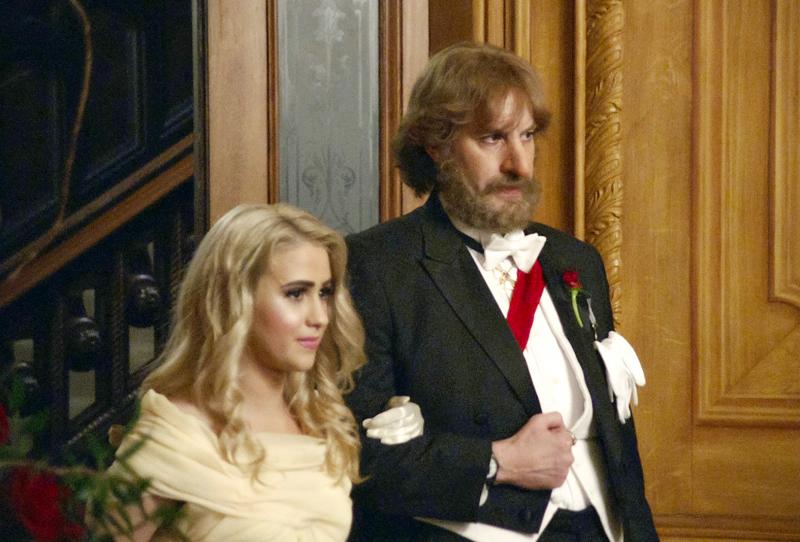Screenplay writing, usually a fairly solitary, uneventful process, is more of a full-contact sport for a movie like Borat Subsequent Moviefilm.
Work for the nine Oscar-nominated writers of the Borat sequel began conventionally enough. Brainstorming, a draft, a table read. But as soon as shooting starts, there’s no telling what can happen, how people will react to Sacha Baron Cohen’s Kazakh alter-ego, or what strange circumstances might befall their protagonist.
As Borat hurtles through the world, a team of writers trails along, endlessly writing and rewriting for every evolving scenario. Take, for example, when Baron Cohen ended up in a five-day lockdown with two QAnon believers. Anthony Hines, a writer and producer on the film, would reach Baron Cohen by stealthily taking a ladder to Baron Cohen’s second-floor bedroom, like a Cyrano de Bergerac of comedy.

Photo: AP
“It was quite sort of dark and dangerous,” says Hines, a longtime collaborator of Baron Cohen’s. “It was literally a matter of climbing up that ladder and poking your head into Borat’s bedroom window at 2am and giving him feedback and giving him some ideas.”
Like most things about Borat Subsequent Moviefilm, the film’s Academy Awards nomination for adapted screenplay is unusual. Seldom are the scripts to broad comedies nominated, but both Borat films have been. Its nine writers are the most ever nominated in the category. (When it won at the Writer Guild Awards, Baron Cohen theorized it was because 60 percent of the guild worked on the movie.) And the film’s full title — Borat Subsequent Moviefilm: Delivery of Prodigious Bribe to American Regime for Make Benefit Once Glorious Nation of Kazakhstan — is the longest ever for an Oscar nominee.
“When they read out the nomination and the title of the film, I think it will essentially feel like a filibuster,” Dan Mazer said on a recent Zoom interview with Hines and four other of the film’s writers, Peter Baynham, Dan Swimer, Jena Friedman and Nina Pedrad.

Photo: AP
“If we win, it’s a massive boost the trophy manufacturing industry,” added Hines.
You can read a transcribed script of Borat Subsequent Moviefilm, and it does make for a unique reading experience. Descriptions include “EXT. MEL GIBSON SQUARE DAY.” But the movie’s final form gives you only a small window into the gonzo art of writing for Borat.
There are plenty of scenes scripted straightforwardly, but screenwriting for Borat also means finding ways to manipulate the real world, guessing how people will respond, and shoehorning those guerillas encounters into a coherent narrative. That adds up to, says Hines, “an extraordinary amount of writing — far, far more than a conventional movie.”

Photo: AP
“There’s nine movies,” Swimer says.
SCRIPTS WITHIN SCRIPTS
A lot of what they do never comes near the screen, nor is it even designed to. To help lure Rudy Giuliani for the film’s infamous hotel room scene, they created a fake documentary about the coronavirus called Keeping America Alive: How Trump Defeated COVID. After watching the tape, Giuliani’s office OK’ed the interview under the impression it was for that film.
“That’s a writing process all of its own. It’s like scripts within scripts,” says Hines. “We shot part of that documentary with other people who were not going to be in the movie like a sizzle reel with a voiceover going something like: ‘Where Trump saw an invisible enemy, the Democrats saw an invisible friend.’”
Sometimes — especially during the run-up to the election last year — real-life farce could seem like their handwork, too. Giuliani’s Four Seasons Landscaping press conference, for instance. “That was us as well,” Baynham says. “We wrote the Landscaping thing.”
Most of the writers are Borat veterans, many of them going back to Da Ali G Show. But on Subsequent Moviefilm, Baron Cohen (a credited writer, too, and a regular presence in the writing room) brought some fresh voices to Borat, including Friedman, Pedrad and Erica Rivinoja. Their input was key in mapping the journey of Borat’s daughter Tutar through American-style misogyny and Borat’s slow, strange transition to what might be called feminism.
But because Borat Subsequent Moviefilm was made in secret, just joining the project was disorienting.
“I didn’t really even know what the movie was,” says Pedrad (Saturday Night Live). “I go, locked in a room, read the script. A couple pages in, I’m like: ‘This sounds a lot like ... no. Is it?’”
In case of leak, scripts were written in code. Borat’s name never appeared in the pages.
“One minute, he was Sergio from Guatemala, then he was Apu from Armenia,” says Hines.
By the end, the names were all jumbled up. Johnny the Monkey was identified as Jeremy the Horse.
PULLING OFF THE IMPOSSIBLE
Friedman, a Daily Show veteran, was responsible for the scene set in a “pregnancy crisis center.” There, Pastor Jonathan Bright, led to believe that Tutar is pregnant by her father, still argues against abortion.
“I can’t believe we got that scene in a major motion picture,” says Friedman. “I remember there was a discussion like, ‘Do you think we’ll really be able to get a pastor be OK with incest?’ Just knowing what I know from those places, I was like, ‘Absolutely, yes.’”
The writers will play out some scenes with actors beforehand to get a sense of likely responses to Borat. But they also encounter plenty of people who say things that couldn’t possibly be prepared for. If Borat holds up a mirror to American society, the reflection is often unpredictable and disquieting.
That includes the plastic surgeon, Dr Charles Wallace, visited by Borat and Tutar who frankly tells them that he would he would want to sleep with Tutar if Borat wasn’t there. The moment still astounds Mazer.
“It’s a really interesting dilemma we go through because the more extreme it is, the less people believe that it’s real,” he says. “You just go: How do people like that actually exist? And they do, and we find them, and it’s more common than you would imagine.”
Their plans are frequently upended. The pandemic, itself, caused a massive rewrite. Sometimes people get wind that it’s Baron Cohen in disguise. For the scene with Tutar at a Republican women’s event, Borat was removed at the last moment after producers overheard something. In the first Borat film, a Civil War reenactment scene was scrubbed when one of the reenactors’ sons spotted Baron Cohen.
But remarkably frequently, the writers say, Baron Cohen finds a way to make happen the ridiculous scenarios they dream up — scenes they think can’t possibly be pulled off. Sometimes they’re watching along by a live video link. Sometimes they’re hidden among a crowd, as Hines was while an overalls-clad Cohen performed as Country Steve at a pro-gun rally. Or they might be anxiously waiting for word in the writers’ room.
“We’ll be sitting there nervously going, ‘How many of our jokes made it in? How did the scene go?’ The amount of times we’ll get a text back saying, ‘We did it. We got X to happen. We got Y to happen,’” says Mazer, shaking his head.
“It’s like a bank job. It’s like a celebration. You just go, ‘I can’t believe that happened. How did he get to it? I never in my wildest dreams imagined this crazy thing that we wrote ended up manifesting.’”

June 2 to June 8 Taiwan’s woodcutters believe that if they see even one speck of red in their cooked rice, no matter how small, an accident is going to happen. Peng Chin-tian (彭錦田) swears that this has proven to be true at every stop during his decades-long career in the logging industry. Along with mining, timber harvesting was once considered the most dangerous profession in Taiwan. Not only were mishaps common during all stages of processing, it was difficult to transport the injured to get medical treatment. Many died during the arduous journey. Peng recounts some of his accidents in

“Why does Taiwan identity decline?”a group of researchers lead by University of Nevada political scientist Austin Wang (王宏恩) asked in a recent paper. After all, it is not difficult to explain the rise in Taiwanese identity after the early 1990s. But no model predicted its decline during the 2016-2018 period, they say. After testing various alternative explanations, Wang et al argue that the fall-off in Taiwanese identity during that period is related to voter hedging based on the performance of the Democratic Progressive Party (DPP). Since the DPP is perceived as the guardian of Taiwan identity, when it performs well,

The Taiwan People’s Party (TPP) on May 18 held a rally in Taichung to mark the anniversary of President William Lai’s (賴清德) inauguration on May 20. The title of the rally could be loosely translated to “May 18 recall fraudulent goods” (518退貨ㄌㄨㄚˋ!). Unlike in English, where the terms are the same, “recall” (退貨) in this context refers to product recalls due to damaged, defective or fraudulent merchandise, not the political recalls (罷免) currently dominating the headlines. I attended the rally to determine if the impression was correct that the TPP under party Chairman Huang Kuo-Chang (黃國昌) had little of a

At Computex 2025, Nvidia CEO Jensen Huang (黃仁勳) urged the government to subsidize AI. “All schools in Taiwan must integrate AI into their curricula,” he declared. A few months earlier, he said, “If I were a student today, I’d immediately start using tools like ChatGPT, Gemini Pro and Grok to learn, write and accelerate my thinking.” Huang sees the AI-bullet train leaving the station. And as one of its drivers, he’s worried about youth not getting on board — bad for their careers, and bad for his workforce. As a semiconductor supply-chain powerhouse and AI hub wannabe, Taiwan is seeing